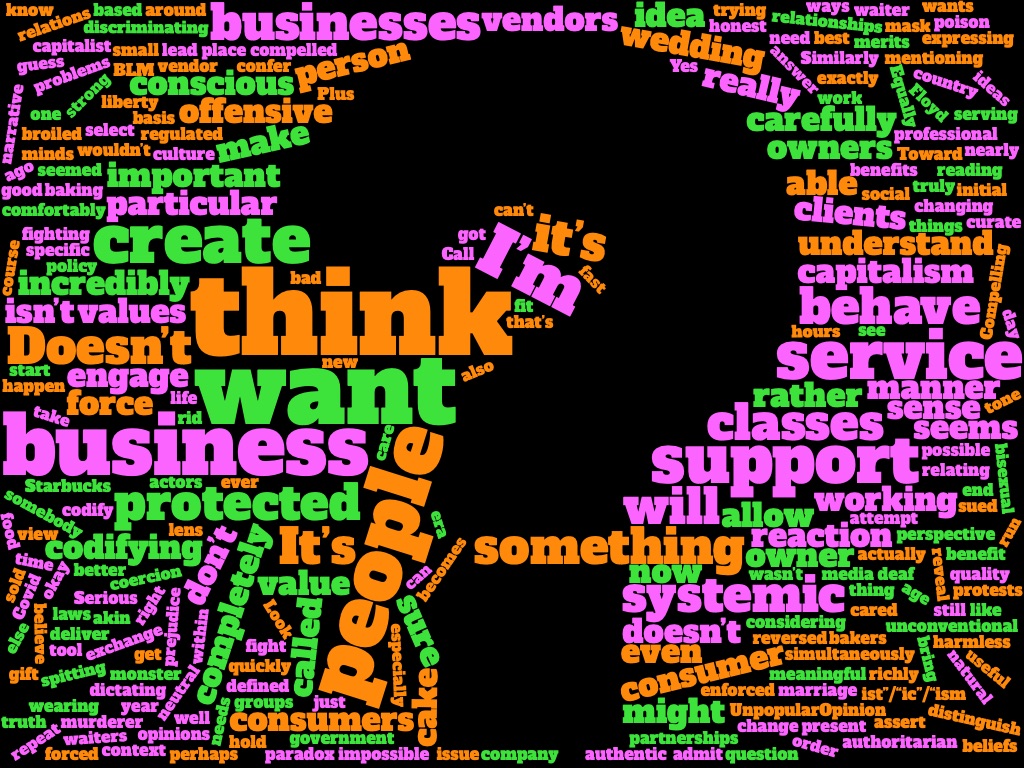While the country is still richly in broiled in protests around Floyd and BLM, and while the idea of systemic discrimination is present in our minds, perhaps now is a good time to bring up ongoing and expanding ways in which we are codifying “ist”/“ic”/“ism” into our laws.
Before going further, it merits mentioning that, as a small business owner, I have strong opinions about other people dictating how I run my business. I think in order to be able to deliver the best quality service, a service professional needs the liberty to carefully curate their clients. Equally so, I think clients benefit most when they carefully select the vendors with whom they co-create relationships.
Toward this end, I hold a rather unconventional view in this day and age:
I’m completely okay with businesses discriminating as they see fit and I think we should get rid of protected classes.
I’m sure for many the initial reaction reading that is something akin to, “how could you you monster!? This will just lead to more problems!”
Of course, then there’s the counterpoint. I think it’s immoral to force a business owner to behave in a particular manner that is against their beliefs and desires.
The truth is, I think discrimination is incredibly important. Yes, I repeat: I think discrimination is incredibly important. And guess what? We all do it! And it’s a useful tool! It is how we distinguish poison from nourishment. Whether it’s a person, an idea, an attitude, or something else, discrimination should be valued for the gift that it is.
As a consumer, I want to know that the person I’m working with genuinely wants to be working with me not that they are being forced to do so and only giving me the service because they are conscripted to do so. When I think of forcing businesses or employees in businesses to engage in relations with me I think of waiters spitting in my food before serving it. It seems like the natural reaction to something so authoritarian. A year ago that might have seemed more harmless than it does in this era of Covid where, if you believe the narrative being sold us, and because I’ve been called labeled as such for expressing ideas about not wearing a mask, one might assert that spitting waiter was a murderer.
As a conscious capitalist, both in the context of consumer and service provider, I want to create meaningful partnerships which isn’t possible when you can’t have authentic relating between consumers and business owners which becomes impossible when business owners are compelled to behave in a particular manner defined, regulated, and enforced by government. It’s coercion and force and I don’t support it.
It’s not 1960. It’s 2020… We have social media. Call-out culture will very quickly take care of “bad actors“. Look at how fast Starbucks got called out and within hours completely reversed its policy. I’m sure for any company that’s more offensive it will also happen… especially considering what they did wasn’t offensive, rather an attempt to create a neutral work place. Although, personally, I am unconvinced what Starbucks did was anything more than a marketing ploy. It seems to me no matter what choice they made they won. If the initial ban on wearing BLM shirts was well received, they’d be seen as creating a neutral, non-hostile work environment. And, if it didn’t work, it gave them an opportunity for some great press to make it look like they are responsive to the world around them. Surely there are some people that will call it pandering to woke culture, but in the end, press is press and if Trump proves nothing else, he certainly has helped illuminate how there’s no such thing as bad press.
I do not for the life of me understand how the people that sued the bakers who wouldn’t make their wedding cake for them even cared. I’m bisexual so this isn’t an issue with me being “tone deaf“. Thinking of the earlier example of a waiter spitting in your food before serving it, I would have an even more paranoid thought about a baker compelled to make my cake ruining it in someway and making my guests sick. Maybe I’m just paranoid but I have to ask: Why would you want somebody baking your wedding cake that doesn’t want to support your marriage? Serious question!!!
Similarly, why would you want to engage in value-for-value exchange… Which is exactly what capitalism is… With a vendor that doesn’t support your values? Doesn’t it make more sense for vendors to be able to reveal their values? Doesn’t that then allow us to be better consumers? Doesn’t that then allow us to create the basis for truly conscious capitalism? If we want to change, we really need to start changing how we behave. Compelling people to do things is not the answer. I don’t think it ever has been.
Plus, if you’re honest about it, you’d have to admit that protected classes themselves actually codify and confer benefits on specific groups of people based on characteristics affiliated with various “ist”/“ic”/“ism” which is codifying systemic prejudice. Isn’t that what we’re trying to fight right now? I don’t understand this paradox and how people can comfortably support protected classes while simultaneously fighting systemic discrimination since, it seems from my lens of perspective, to be the same thing. #UnpopularOpinion

 Susan Rosenberg: “According to IRS filings, Susan Rosenberg handles all charitable donations for BLM” Also…
Susan Rosenberg: “According to IRS filings, Susan Rosenberg handles all charitable donations for BLM” Also…